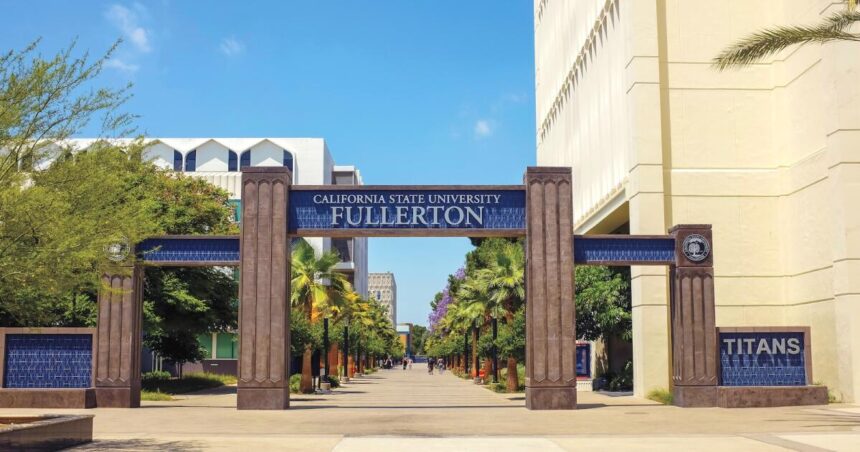Good morning, and welcome to the . It’s Sunday. Don’t forget to switch your devices back an hour for. I’m your host, Andrew J. Campa. Here’s what you need to know to start your weekend:
Degrees and jobs, please. CSU system rethinks student success amid college value skepticism
While there have been many changes from my time as a Cal State University student to a current adjunct professor over a decade-plus span, one concern seems ever present.
It’s a question my students ask with frequency: “What am I going to do after I graduate?”
My reported that the Cal State University system, or CSU, has historically valued its graduation rate, rather than post-graduation employment rate, as the top marker for student success.
That, however, may be changing as the 23-campus school system is shifting its goalpost. Yes, four-year degrees are still important but so are good jobs as more consumers, parents, families and students question the value of a college education.
To that end, Watanbe reported to link higher education with more career paths, networking and pathways to internships and jobs.
Who attends the Cal State system?
About 30% of CSU students are first-generation and nearly 50% are Latino. That marks a sizable shift from 24% in 2007, when CSU Chancellor Mildred García then stepped in to head the Dominguez Hills campus.
Latino, Black, American Indian and Alaska Native, historically underrepresented groups constitute 54% of the system’s 460,000 students.
García said that many students, including first-generation college students, may not have social connections to build resumes, place in internships and fellowships or other experiences that help launch careers.
She called on campuses to be more intentional about career guidance.
“We have to show students what’s the endgame,” García said in an interview. “It’s not graduation. It’s how do we connect graduation to either a career that they’re studying or graduate school and help them get to that? That’s what families want, right? ”
Growing skepticism over the value of college
García — who was also Cal State Fullerton’s president at one time — said she wanted to focus on post-graduate career success.
She said she witnessed growing skepticism about the value of a college degree while serving as president of the 350-member American Assn. of State Colleges and Universities in Washington, D.C.
She kept those memories in mind when she returned to the Golden State last fall to run the CSU system.
García felt that the university’s first-generation and unrepresented students often enter college with “limited knowledge” of the wide array of available careers.
How a little help could have gone a long way
Cal State Fullerton fourth-year student Suzette Morales, the daughter of Guatemalan immigrants with elementary school educations, said more career guidance is crucial.
Morales said she didn’t know of internships or how to get one until a friend mentioned it in her after her freshman year.
Despite early interest in law school, she did not know about the requirement for a law school exam or how to pay for it, causing her to put that goal on hold for now while she finishes school and serves in the U.S. Coast Guard.
“I had no experience with corporate jobs and no one to talk to about it,” Morales said.
The work to more intentionally link higher education and post-graduate jobs is just beginning, García said. She added, however, that the school system’s success is crucial for not only students but also cities, the state and nation, which will need the health professionals, teachers, businesspeople and other educated workers to keep the economy vital and strong.
“We have the talent,” García said. “We have to make sure that we understand that public higher education is an investment.”
Watanabe reports on the vital issue along with .
The week’s biggest stories
We’re on the final Election Season push until Tuesday’s last day of voting
The Los Angeles Dodgers celebrate their long-desired parade
Crime, courts and policing
Southern California happenings
More big stories
Get unlimited access to the Los Angeles Times. .
Column One
Column One is The Times’ home for narrative and longform journalism. Here’s a great piece from this week:
. His backhand is like a precision laser carving up the baseline. To the casual observer, he’s the mustachioed version of Roger Federer. Yet he lives in a world far different than the one the Maestro glided through on the way to 20 Grand Slam singles titles.
More great reads
How can we make this newsletter more useful? Send comments to .
For your weekend
Going out
Staying in
L.A. Affairs
Get wrapped up in tantalizing stories about dating, relationships and marriage.
. They navigated the streets of Los Angeles, eventually enjoying volumes of vinyls and taking that kitschy Instragram flick under the store’s arch of books. On another outing, they packed a couple of poke bowls and headed to the Hollywood Bowl to see Weezer and Alanis Morissette. Visions of the future were difficult to avoid.
Have a great weekend, from the Essential California team
Andrew J. Campa, reporter
Carlos Lozano, news editor
Check our , and the on .










